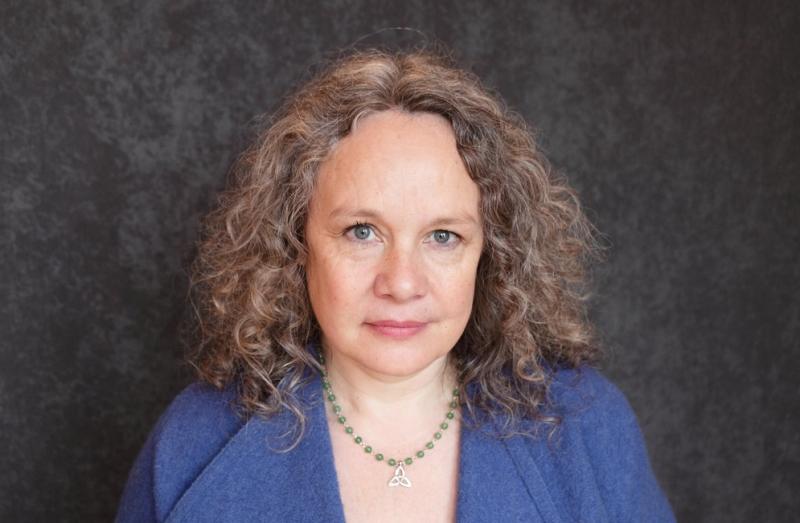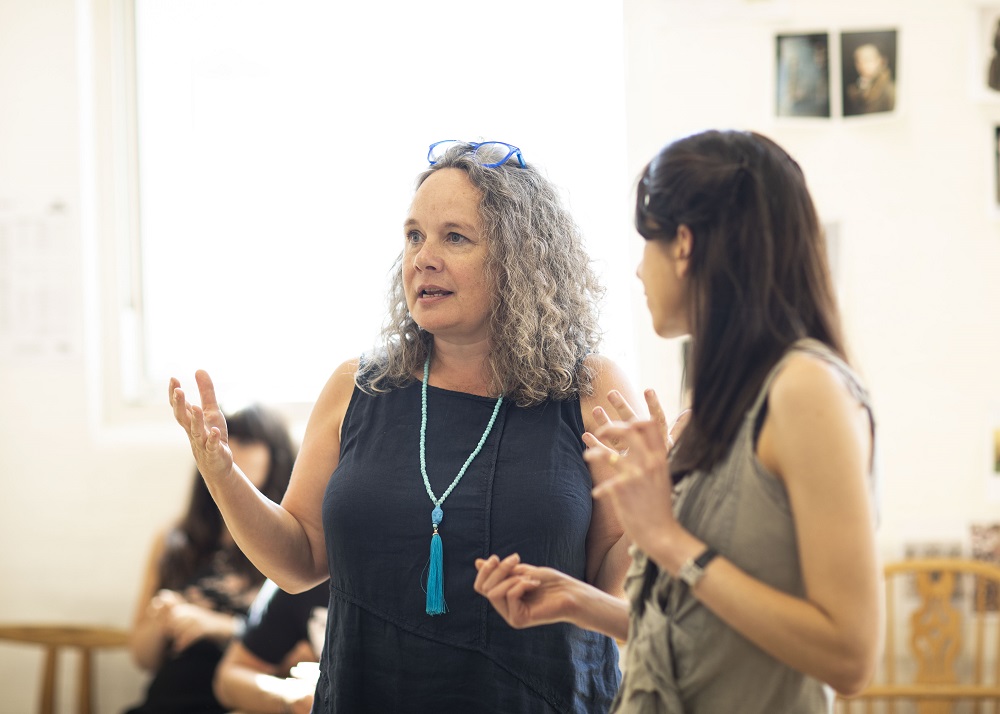Charlotte Jones: ‘Plays come from your scar tissue’ | reviews, news & interviews
Charlotte Jones: ‘Plays come from your scar tissue’
Charlotte Jones: ‘Plays come from your scar tissue’
The playwright introduces 'The Meeting', her new play for Chichester Festival Theatre

I think it’s always a dangerous sport to try and consciously unravel where your ideas come from. Lest you break the spell and inadvertently silence yourself…
There’s always the superficial reasons, of course: the geography and the history of a play. My new play The Meeting, which opens at the Minerva Theatre in Chichester this month, came from my experience of attending a Friends’ Meeting House in Lewes. I didn’t go to a Quaker Meeting in order to research and write a play. I went because I was seeking something for myself, for my life. Silence, possibly. Meaning, certainly. My children were very young and I was craving some space for myself. I felt at a low ebb as a playwright – I had had my big hit (Humble Boy) and I was chasing another. I was starting to write for TV and radio – and I was enjoying the relative invisibility of those mediums compared to the raw exposure of a theatre press night. I had moved out of London and my focus was on my family life. I began to think that I would never write another theatre play.
I grew up in the Roman Catholic Church – the daughter of an Irish immigrant mother, I was educated at a convent by nuns from when I was four till I was 18. The Liturgy of the Word runs in my bloodstream. When I left school, I spectacularly turned my back on the Church. For I had found a new religion – the theatre. I remember talking about this with the director John Caird, whose father was a celebrated theologian. He said sitting in a dark theatre for days during the technical rehearsal, collectively willing the production to come together, can feel like a dark night of the soul. There is rite and ritual aplenty. And on some level we are all seeking transcendence. (Pictured below: Charlotte Jones in rehearsal for The Meeting with director Natalie Abrahami. Image by Helen Maybanks) Opposite the Roman Catholic Church I attended throughout my childhood there was a Quaker Meeting House. It had a beautiful garden. My mother told me it was a cult but I was still drawn to it. It took me 43 years to enter a Quaker Meeting House and, to my surprise, what I discovered there reawakened my love of theatre. Quakers worship in silence until they are moved “by the Spirit” to speak. You are encouraged to weigh your words carefully. “Discernment” is key. At one of my first Meetings an elderly man sitting next to me stood up and announced simply that he was dying but that he had no fear of death and he was grateful, in the absence of any living relatives, for the tender love and care he had found here in the Quaker Meeting. When he sat down, I noticed that the quality of the silence in the room changed utterly. It was like one of those great moments in theatre where an actor achieves a level of truth that the audience instinctively recognise. “You could hear a pin drop,” we tend to say in theatrical parlance. The Quakers call it a “gathered silence”.
Opposite the Roman Catholic Church I attended throughout my childhood there was a Quaker Meeting House. It had a beautiful garden. My mother told me it was a cult but I was still drawn to it. It took me 43 years to enter a Quaker Meeting House and, to my surprise, what I discovered there reawakened my love of theatre. Quakers worship in silence until they are moved “by the Spirit” to speak. You are encouraged to weigh your words carefully. “Discernment” is key. At one of my first Meetings an elderly man sitting next to me stood up and announced simply that he was dying but that he had no fear of death and he was grateful, in the absence of any living relatives, for the tender love and care he had found here in the Quaker Meeting. When he sat down, I noticed that the quality of the silence in the room changed utterly. It was like one of those great moments in theatre where an actor achieves a level of truth that the audience instinctively recognise. “You could hear a pin drop,” we tend to say in theatrical parlance. The Quakers call it a “gathered silence”.
And so out of the silence I started to find my voice again. I have written this play slowly. I have turned to it as a refuge from the rigours of dealing with noisy script executives in TV and film meetings. I have let it grow at its own pace and with no expectation of a production. During the play’s long distillation I had a spinal injury that caused painful neuropathy in my hands. It became difficult to type. I kept going for The Meeting. I found I had no choice but to do so. Like many of my female contemporaries, it has been my experience that it is harder for us to be produced and harder to be heard. All that has gone into the writing. And that’s where plays really come from, I think: from your scar tissue, from the deep, dark wounds that unconsciously drive you. And as hard as it sometimes is, it is still a privilege to make this my work. Quakers have a testimony to truth in the same way as artists do. And audiences. For ultimately the truth is what sets us all free.
- The Meeting at Chichester Festival Theatre’s Minerva Theatre from 13 July to 11 August
- More First Person articles on theartsdesk
Share this article
The future of Arts Journalism
You can stop theartsdesk.com closing!
We urgently need financing to survive. Our fundraising drive has thus far raised £49,000 but we need to reach £100,000 or we will be forced to close. Please contribute here: https://gofund.me/c3f6033d
And if you can forward this information to anyone who might assist, we’d be grateful.

Subscribe to theartsdesk.com
Thank you for continuing to read our work on theartsdesk.com. For unlimited access to every article in its entirety, including our archive of more than 15,000 pieces, we're asking for £5 per month or £40 per year. We feel it's a very good deal, and hope you do too.
To take a subscription now simply click here.
And if you're looking for that extra gift for a friend or family member, why not treat them to a theartsdesk.com gift subscription?
more Theatre
 Troilus and Cressida, Globe Theatre review - a 'problem play' with added problems
Raucous and carnivalesque, but also ugly and incomprehensible
Troilus and Cressida, Globe Theatre review - a 'problem play' with added problems
Raucous and carnivalesque, but also ugly and incomprehensible
 Clarkston, Trafalgar Theatre review - two lads on a road to nowhere
Netflix star, Joe Locke, is the selling point of a production that needs one
Clarkston, Trafalgar Theatre review - two lads on a road to nowhere
Netflix star, Joe Locke, is the selling point of a production that needs one
 Ghost Stories, Peacock Theatre review - spirited staging but short on scares
Impressive spectacle saves an ageing show in an unsuitable venue
Ghost Stories, Peacock Theatre review - spirited staging but short on scares
Impressive spectacle saves an ageing show in an unsuitable venue
 Hamlet, National Theatre review - turning tragedy to comedy is no joke
Hiran Abeyeskera’s childlike prince falls flat in a mixed production
Hamlet, National Theatre review - turning tragedy to comedy is no joke
Hiran Abeyeskera’s childlike prince falls flat in a mixed production
 Rohtko, Barbican review - postmodern meditation on fake and authentic art is less than the sum of its parts
Łukasz Twarkowski's production dazzles without illuminating
Rohtko, Barbican review - postmodern meditation on fake and authentic art is less than the sum of its parts
Łukasz Twarkowski's production dazzles without illuminating
 Lee, Park Theatre review - Lee Krasner looks back on her life as an artist
Informative and interesting, the play's format limits its potential
Lee, Park Theatre review - Lee Krasner looks back on her life as an artist
Informative and interesting, the play's format limits its potential
 Measure for Measure, RSC, Stratford review - 'problem play' has no problem with relevance
Shakespeare, in this adaptation, is at his most perceptive
Measure for Measure, RSC, Stratford review - 'problem play' has no problem with relevance
Shakespeare, in this adaptation, is at his most perceptive
 The Importance of Being Earnest, Noël Coward Theatre review - dazzling and delightful queer fest
West End transfer of National Theatre hit stars Stephen Fry and Olly Alexander
The Importance of Being Earnest, Noël Coward Theatre review - dazzling and delightful queer fest
West End transfer of National Theatre hit stars Stephen Fry and Olly Alexander
 Get Down Tonight, Charing Cross Theatre review - glitz and hits from the 70s
If you love the songs of KC and the Sunshine Band, Please Do Go!
Get Down Tonight, Charing Cross Theatre review - glitz and hits from the 70s
If you love the songs of KC and the Sunshine Band, Please Do Go!
 Punch, Apollo Theatre review - powerful play about the strength of redemption
James Graham's play transfixes the audience at every stage
Punch, Apollo Theatre review - powerful play about the strength of redemption
James Graham's play transfixes the audience at every stage
 The Billionaire Inside Your Head, Hampstead Theatre review - a map of a man with OCD
Will Lord's promising debut burdens a fine cast with too much dialogue
The Billionaire Inside Your Head, Hampstead Theatre review - a map of a man with OCD
Will Lord's promising debut burdens a fine cast with too much dialogue

Add comment